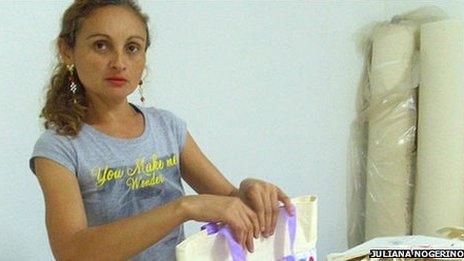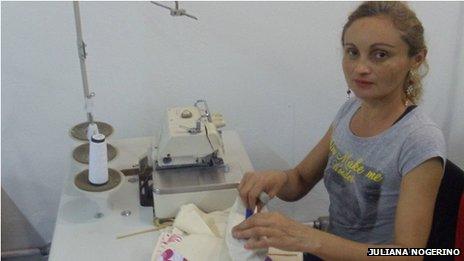Maid to entrepreneur: Rising out of poverty in Brazil
- Published

Lucineide do Nascimento was born into a large family in rural north-eastern Brazil
Lucineide do Nascimento has come a long way from her birthplace near Natal in the poor north-east of Brazil.
Had things gone according to her father's plans, she would have been married as a teenager and followed a traditional rural lifestyle - living off produce grown on the family farm.
But she decided to move south and live a different life.
"I was a rebel and went against my parents' wishes," says Ms Nascimento, now aged 44.
She is a small entrepreneur - and her story illustrates the recent social change that has transformed the lives of millions of people in Brazil - many of them women.
Her journey was not easy.
She left her family home at 17, moved to Rio de Janeiro and became a maid, a popular job among poor Brazilian women who have little education.

She says she faced prejudice and was so naive she thought she did not have the right to be paid a regular salary because she lived in her employer's home.
Ms Nascimento soon grew tired of the job and its uncertainties. She moved to the vast sprawling city of Sao Paulo, where she sold domestic supplies.
By then, she was already thinking of ways of fulfilling her dream of having a business of her own. It was 2007, and eco-friendly products were all the rage in Brazil.
Ms Nascimento spotted her opportunity. She rang the local Greenpeace office to ask what would be the best material for replacing plastic supermarket bags.
"And it turned out to be raw cotton, which was precisely one of the things we used grow on my family farm up north," she recalls.
She started crafting the bags at home, after a full day working as a saleswoman, and sold them to other small companies.
'Inspiration'
Her business grew steadily, and today she makes about 10,000 bags per month, employing four people in her small factory in Sao Paulo - including her husband and older son.
Her family in the north-east used to think of her as the "black sheep", she recalls.
Now she is their pride and joy, as well as a role model for the whole family.
"We are a big, humble family of seven siblings. Growing up, we didn't even have electric power. My father was worried about us moving to big cities, he wanted me to marry young and lead a quiet rural life.
"But my parents always trusted me, so I thought it was my responsibility to grow in life," she says.
"Back then, there was little education in my family; their only plans for the future was to have children of their own.
"But I kept telling them that it was important to get an education. Now they all live in the city and many are starting university."
With Ms Nascimento's help, her sister's small business selling home-cooked meals has turned into a fully fledged churrascaria - a traditional Brazilian meat restaurant.
Changing times
Ms Nascimento's experience is becoming more common in Brazil, a developing nation where the gap between rich and poor has been narrowing.

The changes have been particularly marked for Brazilian women. Falling birth rates mean mothers have smaller families to care for and often do better in their chosen professions.
According to Sebrae, a body that promotes entrepreneurship, the number of Brazilian women who became business owners grew by 21% in the past decade, at twice the rate of men.
Still, gender inequality persists in the Brazilian labour market. According to official figures, the average Brazilian woman makes almost 30% less money than her male colleague.
Ms Nascimento plans to triple her sales in the next few years at her business, Edilu Eco-bags.
"Women still face some prejudice, but it's changing. And it's up to us to break the cycle," she says.
And her concerns are now those of a typical urban Brazilian woman.
"I've learned to delegate tasks to my husband and kids, they help me with the company and with the dishes and handle their own school work.
"Now I want to make more time for girly things, for chatting with my girlfriends. I've learned that life is more than work and family!"